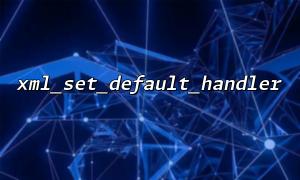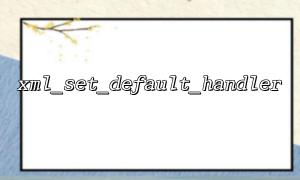When dealing with XML documents, PHP offers a range of powerful functions to help us parse and manipulate XML data. Specifically, when parsing XML data, we often need to respond differently to various types of elements. In such cases, the xml_set_default_handler function plays a crucial role as it allows us to define a default handling method for XML elements that are not explicitly processed.
This article will provide a detailed guide on how to use xml_set_default_handler to flexibly handle various types of XML element processing, with examples demonstrating its practical use.
xml_set_default_handler is a function provided by PHP's XML extension. It allows us to set a default handler function for the XML parser, which will be called whenever the parser encounters an XML element that does not have a specific processing rule defined. In simple terms, this function acts as a "catch-all" mechanism, ensuring that we can handle all elements that are not explicitly processed.
bool xml_set_default_handler ( resource $parser , callable $handler )
$parser: The XML parser resource, typically created using xml_parser_create.
$handler: The default handler function. This function accepts the following parameters:
$parser: The current parser resource.
$data: The current XML data block (string) being processed.
First, create an XML parser, typically using xml_parser_create to create a new XML parser.
$parser = xml_parser_create();
The default handler function is called whenever the parser encounters an element that cannot be processed individually. This function accepts two parameters: the parser resource and the data content.
function default_handler($parser, $data) {
echo "Default handler: " . $data . "\n";
}
Use xml_set_default_handler to specify the default handler function.
xml_set_default_handler($parser, 'default_handler');
Next, we can use xml_parse to parse the XML data. If the parser encounters an element without a defined handler, the default handler will be triggered.
$xml_data = "<root><element>Content 1</element><unknown>Content 2</unknown></root>";
xml_parse($parser, $xml_data);
xml_parser_free($parser);
In this example, when the XML parser encounters the
Default handler: Content 2
Suppose we are handling a complex XML file containing various types of elements. In this case, we can combine xml_set_default_handler with other element handling functions (such as xml_set_element_handler) to flexibly handle different situations.
$parser = xml_parser_create();
<p>// Define the start and end element handler functions<br>
function start_element($parser, $name, $attrs) {<br>
echo "Start element: $name\n";<br>
}</p>
<p>function end_element($parser, $name) {<br>
echo "End element: $name\n";<br>
}</p>
<p>// Define the default handler function<br>
function default_handler($parser, $data) {<br>
echo "Default handler: " . $data . "\n";<br>
}</p>
<p>// Set the start and end element handler functions<br>
xml_set_element_handler($parser, 'start_element', 'end_element');</p>
<p>// Set the default handler function<br>
xml_set_default_handler($parser, 'default_handler');</p>
<p>// Parse the XML data<br>
$xml_data = "<root><name>John</name><age>30</age><unknown>Unknown content</unknown></root>";<br>
xml_parse($parser, $xml_data);</p>
<p>// Free the parser resource<br>
xml_parser_free($parser);<br>
The output will be as follows:
Start element: root
Start element: name
End element: name
Start element: age
End element: age
Start element: unknown
Default handler: Unknown content
End element: unknown
End element: root
In this example, the start_element and end_element functions handle the start and end tags of the XML elements, while the default handler function default_handler processes the content of the
If the XML data contains URLs or other special data, we can also handle them flexibly. In the default handler function, we can parse the data, extract URLs, and perform further processing. For example, if we want to redirect all URLs in the XML to the m66.net domain, we can do so as follows:
function default_handler($parser, $data) {
// Detect and replace URLs with the new domain
$data = preg_replace('/https?:\/\/([a-zA-Z0-9.-]+)\//', 'https://m66.net/', $data);
echo "Processed data: " . $data . "\n";
}
By doing so, we ensure that all URLs parsed from the XML data are replaced with the m66.net domain.
The xml_set_default_handler function provides a flexible way to handle XML elements that do not have explicit handling rules defined. By combining xml_set_element_handler and other related functions, we can perform customized handling based on different element types, while also managing special cases, such as URL handling, within the default handler function. Additionally, regular expressions can be used for flexible processing of special XML content.
These methods help PHP efficiently process and parse various complex XML data, ensuring that our code remains robust and flexible.



